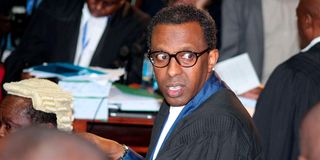Why High Court can't stop Ahmednasir's Supreme Court ban

Lawyer Ahmednasir Abdullahi.
What you need to know:
- In its pleadings, the LSK says the decision by the Apex court to ban Abdullahi was “unfair and unreasonable”
- Justice Mwita will render a ruling on June 21, 2024 whether the High Court has jurisdiction to exercise its supervisory mandate on the Supreme Court like it does to surbordinate courts
The decision to bar Senior Counsel Ahmednassir Abdullahi presenting cases before the Supreme Court cannot be challenged at the High Court, a lawyer told Justice Enock Chacha Mwita.
Chief Justice Martha Koome, the Deputy Chief Justice Philomena Mwilu and the five Supreme Court Judges through lawyers Ochieng Oduol and Kamau Karori on Friday said their resolution to slap the ban on Abdullahi cannot be subject of supervision at the lower court.
Mr Oduol and Mr Karori while objecting to the suit commenced by the Law Society of Kenya (LSK) challenging the decision to keep Abdullahi away from the apex said “the High Court cannot exercise its supervisory role over the Supreme Court.”
“Whether the decision is administrative or pretrial it cannot be subjected to a constitutional petition in the High court as has been done by the Law Society of Kenya,” Mr Oduol submitted.
In January this year, the Registrar of the Supreme Court Ms L M Wachira communicated to Mr Abdullahi through a letter the court had banned him from prosecuting or defending any litigant before it.
In the communique it was stated clearly that, “The Senior Counsel and his law firm should not appear before it over what the court termed as years of consistently distasteful remarks made against the institution and its judges on various media platforms.”
"In view of the foregoing, it is the decision of this Court, that henceforth and from the date of this communication, you shall have no audience before the Court, either by yourself, through an employee of your law firm, or any other person holding brief for you," the letter read in part.
Arising from that communication, a multiplicity of cases were filed at the High court to challenge this ban including this one by the LSK.
In its pleadings, the LSK says the decision by the Apex court to ban Abdullahi was “unfair and unreasonable.”
It further argues that the court condemned the senior counsel, his employees or any other person holding brief for him, without giving them an opportunity to defend themselves despite the “serious nature of the allegations and veracity of the decision”
But the Supreme Court, its Judges and the Registrar have raised an objection to the several suits arguing that, “the High court has no jurisdiction over the matter.”
Mr Oduol submitted before Justice Mwita that once the Supreme Court has rendered a decision on a particular issue and made an order or decision, it follows that it cannot be subject of supervision by the High court.
“It will be a travesty of order of things that a decision, administrative or otherwise is made in the Supreme Court and one rushes to the High Court to interrogate that particular decision,” Oduol stated.
The high court, he said, only has supervisory jurisdiction over subordinate courts.
“It has no jurisdiction over the Supreme Court. This petition therefore a non-stata. The relief’s and prayers sought herein shows you they are a mischief which the petitioner seeks this court to engage in,” Mr Oduol submitted.
He therefore impressed upon the judge to uphold the preliminary objection for lack of jurisdiction and the absolute immunity the Judges enjoy from civil proceedings.
In answer to the objection by the Apex Court Judges the LSK through lawyer Isaa Mansur for Abdullahi and members of his firm said the Judiciary does not enjoy absolute immunity as contemplated by Oduol and Karori but it is subject to checks and balances.
Mansur said in his submissions, “Judicial immunity cannot be used as a shield from accountability.”
Added he: “What Karori and Oduol are saying is that regardless of what the Supreme Court or member of judiciary does there is absolute immunity even in matters done in bad faith,that is not what the constitution advocates for.”
He said the immunity spoken about should not be given especially when it subverts the constitution.
The lawyer prayed to Justice Mwita to reject the objection raised by the Seven Apex Court Judges then allow the case to proceed to full hearing.
Another lawyer for LSK Mr Wilfred Nderitu also submitted that there is no dispute that Abdullahi as he was not given a chance to be heard.
Equally the same fate was suffered by those employed in his law firm.
“Kenya is a country governed by the rule of Law. The rule of law requires that no one shall be condemned unheard. Clearly the principle of natural justice was violated in this case,” Nderitu said.
Justice Mwita will render a ruling on June 21, 2024 whether the High Court has jurisdiction to exercise its supervisory mandate on the Supreme Court like it does to surbordinate courts.





